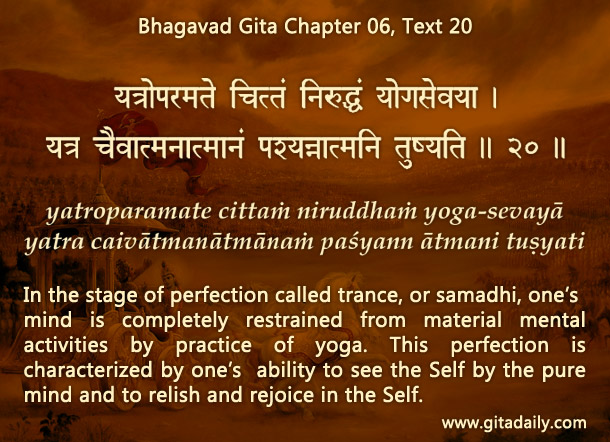Meditation requires us to turn our attention from the world’s promises of pleasure to a higher reality. Such turning away from the world requires a sturdy and steady intelligence that understands the nature of the world’s promises about material pleasures. Material Realization for Spiritual Growth
In the Bhagavad-gita (06.20-23), the perfectional stage of meditation is described in verses, wherein the yogi attains samadhi, or divine absorption. This series begins (06.20) by declaring that not only does the yogi no longer strive for worldly pleasures, but also that the yogi’s mind no longer craves these pleasures — the material movements of consciousness cease even at the mental level.
Such an understanding is the foundation that enables us to launch our consciousness into the vast space of spiritual reality, where true happiness can be found. That launching of consciousness requires a certain level of detachment from the world, which comes from understanding that the many promises the world makes are either unachievable or unaffordable.
Unachievable in the sense that no matter how glamorized sensual pleasure might be by the world’s propaganda, the actual pleasure is frustratingly fleeting. What is dreamed of for years often ends up as an outrageous anticlimax within moments or at the most minutes. The idea of perpetual sensual delight is unachievable not because the worldly objects are unavailable, but because our sensory tools for enjoying those objects are inescapably limited in their capacity to provide lasting enjoyment.
Even if certain worldly pleasures may be achievable, they often require such a uni-dimensional, obsessive pursuit that they end up disturbing, disrupting, or even destroying other aspects of our lives. For example, workaholics may become professionally successful but face personal failures, with their family fragmented, their health compromised, and their minds traumatized.
The more we gain conviction that the world’s promises are either unachievable or unaffordable, the more we can focus on our meditation without deviation and therein experience increasing immersion and satisfaction.
Summary:
- Meditation requires a turning away from the visible world with its many promises of pleasure.
- For such turning away, we need to be convinced that the many pleasures the world promises are unachievable or, even when achievable, unaffordable.
- With such conviction, we stop striving for those pleasures and even our mind stops craving them, thereby allowing us to attain the immersion in meditation that will propel us to supreme satisfaction.
Think it over:
- When have you experienced the world’s promises of pleasure to be unattainable?
- When have you experienced such pleasures to be unaffordable?
- How can you use these twin realizations of the nature of the world’s pleasures to enhance your meditation?
***
6.20 In the stage of perfection called trance, or samādhi, one’s mind is completely restrained from material mental activities by practice of yoga. This perfection is characterized by one’s ability to see the Self by the pure mind and to relish and rejoice in the Self.


Leave A Comment